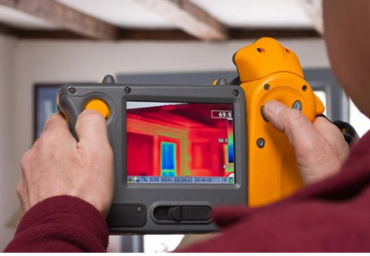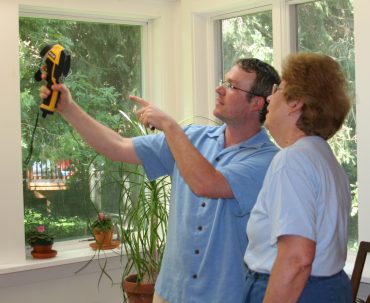
John Bleasby
Energy audits are coming! What do builders need to know?
Canadian ContractorWho are these "energy advisors" and what do the energy ratings mean?
Decades ago, home inspectors rode into town, offering home-buyers honest third party assessments of homes on the resale market. Now, in the current environment of Net Zero Energy (NZE), increasing amounts of attention is being paid to energy audits of both existing homes, particularly older ones in need of energy efficiency upgrades, and to energy efficiency ratings of new homes. Call in the energy advisors!
What is the background of these energy ratings?
It all started in 1998 when, according to their website, “Natural Resources Canada introduced the home energy rating system…to provide an unbiased, credible way to estimate how energy is used in a home and encourage measures to reduce energy use.” Standards and rating systems have evolved over time in consultation with industry and other stakeholders.
 Natural Resources Canada launched a new rating system in 2015 called EnerGuide Rating System v.15 (ERS v.15) to provide a consumption-based rating scale (gigajoules/year) from one to 100; the more efficient a house, the higher the rating number. Fifty is the median. Zero represents a house with poor energy efficiency and high utility costs, whereas 100 represents an airtight and well-insulated house where energy purchased and energy generated through renewable sources, is equal, aka Net Zero.
Natural Resources Canada launched a new rating system in 2015 called EnerGuide Rating System v.15 (ERS v.15) to provide a consumption-based rating scale (gigajoules/year) from one to 100; the more efficient a house, the higher the rating number. Fifty is the median. Zero represents a house with poor energy efficiency and high utility costs, whereas 100 represents an airtight and well-insulated house where energy purchased and energy generated through renewable sources, is equal, aka Net Zero.
Today, the new rating system has been adopted by British Columbia, Saskatchewan, Manitoba, Alberta, Yukon, Ontario, New Brunswick, and Prince Edward Island. In addition to ratings on existing homes, U.S. energy agencies have pioneered the use of Energy Star® ratings on new homes similar to what is seen on highly ranked appliances. It’s since been adopted in Canada and elsewhere around the world. It’s the crème de la crème. An EnerGuide rating greater than 75 may qualify the home for Energy Star® recognition.
(for more information on the evolution of energy rating systems in Canada, read Canadian Contractor’s recent coverage CLICK HERE)
Who are these guys doing the energy audits?
According to the Ministry of Natural Resources, “An energy advisor is an individual who conducts EnerGuide home evaluations on behalf of service organizations licenced by Natural Resources Canada. Energy advisors provide third party expert advice to homeowners looking to improve energy efficiency of their homes, and can also work with builders who wish to use the ERS v.15 in the planning and design stages of their new constructions. Energy advisors help ensure homes labelled under NRCan’s energy efficiency housing initiatives meet the requirements of the respective standards.”

Who can be an energy advisor? Almost anyone, really.
How high is the energy advisor qualification bar?
Good question. One training website welcomes those with building experience combined with a higher calling. “Are you a reliable individual familiar with home building and construction terminology? Do you have experience with, or knowledge about, home heating and cooling systems, or home inspection? Are you passionate about energy efficiency, skilled at customer service, good with computers and dedicated to making a difference in Canada and the world?”
From the pure regulatory standpoint, the requirements appear to be rather basic. Natural Resources Canada says that to become registered as an energy advisor and to deliver services under ERS v.15, candidates must demonstrate proficiency by:
- Passing the Foundation Level exam,
- Passing the Energy Advisor exam,
- Being affiliated with a service organization,
- Completing probationary files to the satisfaction of the service organization that show their competence with energy simulation modelling and field work,
- Providing proof of a criminal check to the service organization.
“The Foundation Level exam and the Energy Advisor exam are hosted by an independent organization and are taken at proctored testing centres across Canada. Natural Resources Canada provides competency profiles for each exam, which details the requisite skills, knowledge and abilities for the position. These competency profiles were used as the basis for the development of the exams and identify the topics that will be on the respective exams.
Five days plus $1500 and you’re in!
In actual fact, the barriers to entry are not that high. The same training website cited above opens the door to virtually all comers: “Familiarity with home building and construction terminology or a minimum of two years’ experience in the building/renovation industry or home inspector training, or a background in any of the following: engineering, architecture, home heating/cooling systems, or construction.” They further suggest that it would be helpful if applicants were, “good with computers, physically fit, have achieved high school level geometry and math, and have good communications skills in English.”
Training is relatively short. Courses range from three to five days depending on the depth of training undertaken, with tuition around $1500 plus the cost of required testing equipment. Some training courses can even be taken on-line!
Buyer Beware
Not surprisingly, there is potential for inspection problems. Canadian Contractor was unable to find many recent reviews of energy advisors, good or bad, on two of the country’s leading consumer review websites or on the Better Business Bureau complaint page. However, when reviews five years and older are read, there are complaints concerning auditor recommendations. Most concern either a poor capital investment pay-back benefit or recommended improvements that were not fully covered by whatever rebate grants were available from the respective provinces at the time. Other complaints concern incomplete reports or a failure of the advisor to file reports at all. (For a list of 10 common energy audits problems that might be avoided, CLICK HERE)
Hiring an energy advisor for a renovation?
The City of Toronto offers a number of recommendations to consider when seeking an energy advisor. They include hiring an advisor with at least 10 years’ experience in the field, preferably a Professional Engineer (PE) and/or a Certified Energy Manager (CEM). The City further suggests that one should check the advisor’s references thoroughly and ask for a copy of a sample audit. Also, walking around the building with the advisor will ensure that concerns and challenges are properly identified by all. The draft report should be read with a critical eye to ensure that it accurately reflects the state of the home. Finally, the builder needs to ensure that the client is prepared to integrate the recommendations of the energy audit into their overall capital plan.
A competitive advantage?
Nevertheless, as consumer awareness of energy efficiency increases over time, a renovator or new home builder who includes energy audits in their services could, with sensible precautions taken, potentially enjoy a competitive edge.
Follow John on Instagram and on Twitter for notifications about his latest posts


Leave a Reply